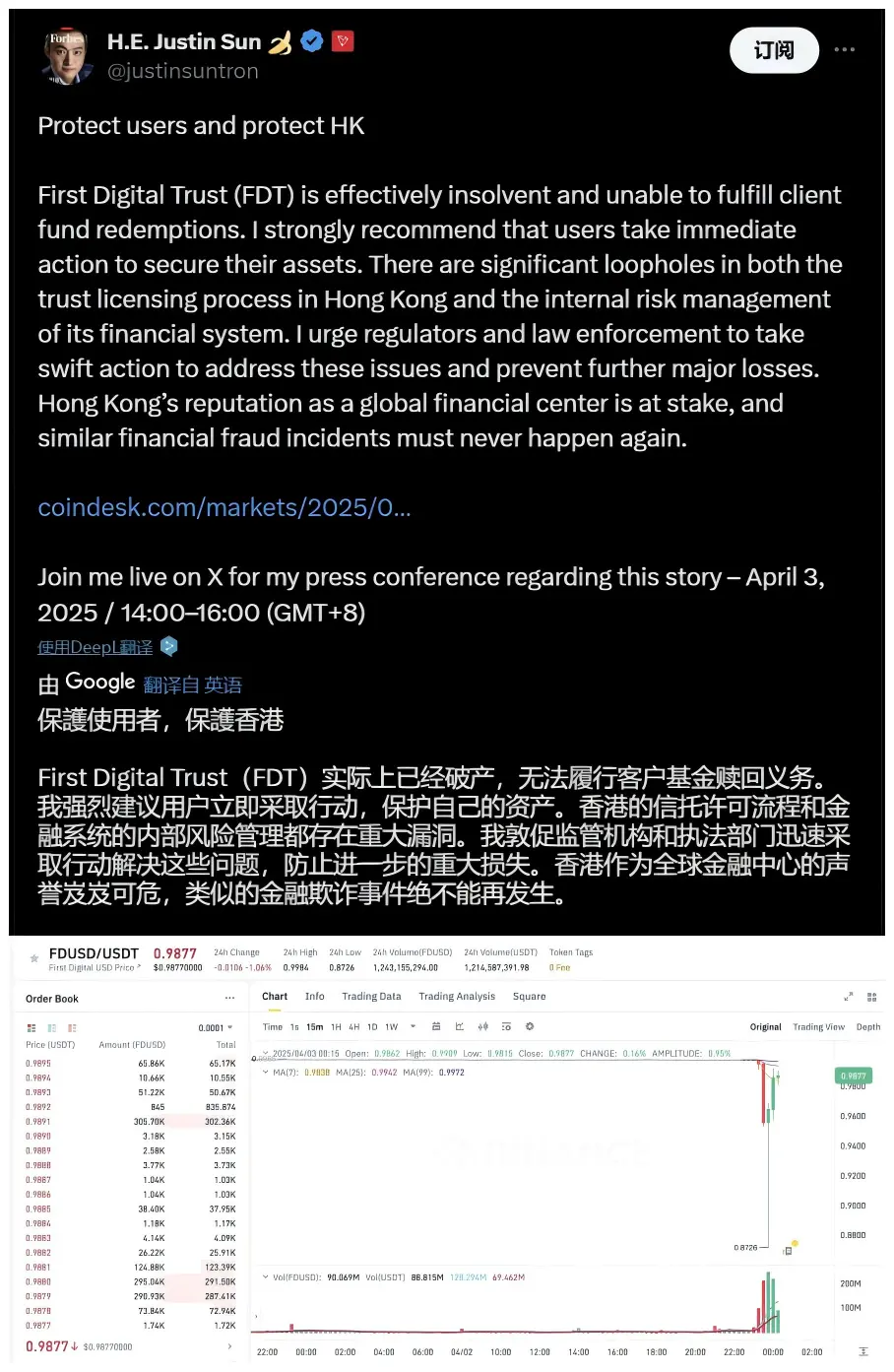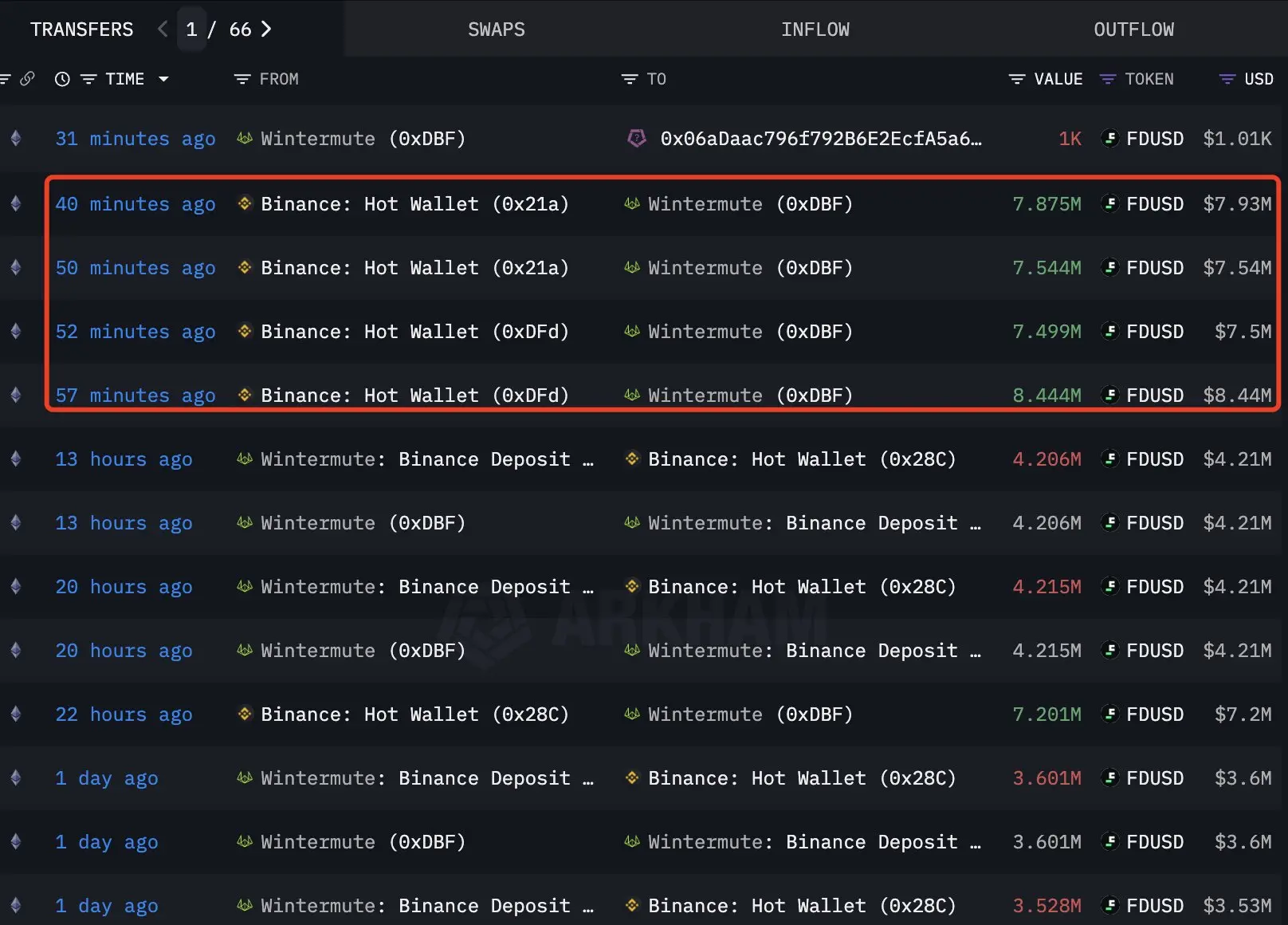Author: Scof, ChainCatcher
Editor: TB, ChainCatcher
The cryptocurrency market has once again been stirred by the "de-pegging" event of a stablecoin.
This time, the protagonist is FDUSD, a stablecoin issued by the Hong Kong trust institution First Digital Trust (FDT), which is pegged to the US dollar at a 1:1 ratio. Within just one hour, the price of FDUSD dropped from $1 to $0.97, and at one point fell to nearly $0.88, resulting in a market cap evaporation of hundreds of millions of dollars. What is even more concerning is that the cause of this turmoil was not a technical flaw or external attack, but rather an "unverified" accusation on social media.
Event Review: Sun Yuchen's Statement Ignites De-pegging
On the evening of April 2, well-known figure in the crypto industry, Sun Yuchen, posted on social media platform X, claiming that the issuer of FDUSD, FDT, had actually gone bankrupt and was "unable to redeem," implying that it might be insolvent. This statement quickly spread throughout the crypto community, and market sentiment deteriorated sharply. Just one minute later, the price of FDUSD on Binance plummeted below $1, and panic spread across the market.

Investors began to sell off FDUSD in large quantities, with some users even experiencing panic-driven exchanges. Within an hour, the trading volume of the FDUSD/USDT trading pair reached 770 million tokens, with a transaction value of $745 million. The market was thrown into chaos.
It is reported that FDUSD is commonly used in Binance's Launchpool projects, where users can lock FDUSD to mine new token rewards. At the same time, FDUSD is also a major alternative to Binance's native stablecoin BUSD.
In response to the de-pegging event, FDT issued a statement early that morning, firmly denying the bankruptcy rumors, stating that its reserve assets were sufficient and that all FDUSD were backed by cash or US Treasury bonds, fully complying with the 1:1 peg requirement. FDT also emphasized that the root of the problem was not FDUSD, but rather a reserve dispute involving another stablecoin, TUSD.
Additionally, a Binance member, SiSi, responded in a user group, stating, "FDUSD can be redeemed 1:1," pointing out that this was a statement from He Yi. Although this was not an official public statement, the news quickly spread in the community, and the price of FDUSD subsequently rebounded to around $0.98.
According to the reserve proof data on the First Digital Trust official website, as of February 2025, FDT's reserve assets were approximately $2.05 billion, while the circulation of FDUSD was 2.04 billion tokens, resulting in a reserve coverage ratio of over 100%. On paper, FDT "is not short of money."
Deeper Background: Sun Yuchen and FDT's Old Grudge?
The turmoil surrounding FDUSD is actually a continuation of an old grudge.
FDT is not the first time to be named by Sun Yuchen. Previously, FDT was sued by Techteryx due to serious issues in managing the reserves of TUSD (TrueUSD). Court documents revealed that part of the reserve funds for TUSD were transferred to the unauthorized entity Aria Commodities DMCC during FDT's custody, resulting in a funding shortfall of nearly $500 million. Ultimately, it was Sun Yuchen who stepped in to provide emergency liquidity support for TUSD in the form of a loan, filling this gap.
This "bailout" was clearly not free. Sun Yuchen subsequently began to question the asset safety of FDT, accusing it of chaotic and opaque management, and even directly stating that FDT "is unable to redeem." FDT, on the other hand, insisted that it was merely a custodian and that all operations were conducted according to Techteryx's instructions, countering by accusing Sun Yuchen of attempting to undermine competitors through smear tactics.
Well-known industry analyst Mirror Tang pointed out that this type of "regulatory black hole" asset misappropriation is not just a one-time operational error, but a manifestation of structural risks in stablecoins. He warned that the market currently has rigid expectations for Binance's redeemability, but once the underlying assets themselves encounter problems, the platform's credit backing is merely a short-term relief, which could exacerbate moral hazards in the long run. He bluntly stated, "Platform credit is not infinite; if repeatedly held hostage by projects, the consequences will be extremely serious."
Additionally, TUSD has experienced redemption difficulties multiple times over the past year, and its original operator, TrueCoin, reached a $500,000 settlement with the SEC for false advertising. A series of negative news has intensified market concerns about FDT's overall credit.
Who is FDT?
First Digital Trust (FDT) is the issuer and reserve custodian of FDUSD, founded and led by CEO Vincent Chok. He previously served as the head of Legacy Trust, worked in Canadian real estate financing, and is active in the crypto asset field, promoting the issuance of FDUSD.
COO Gunnar Jaerv is primarily responsible for technology and products, having previously managed digital asset operations at Legacy Trust and being a key figure in the company's technical architecture.
According to public data, FDT's parent company is First Digital Group, which is also headquartered in Hong Kong. This company can be traced back to Legacy Trust, established in 1992, which is a family office institution serving high-net-worth clients.
Initially, FDT was part of Legacy Trust's digital asset custody business, providing a complete set of solutions including digital asset custody, trust services, API payment channels, and stablecoin issuance management. The issuer of FDUSD, FD121 Limited, is also one of the subsidiaries of First Digital Group.
In the crypto industry, FDT is considered a "hybrid" company that has both traditional financial backgrounds and benefits from blockchain dividends. Public information shows that FDT completed a $20 million financing round in May 2022, with participants including Nogle (an early investor in Telegram) and local blockchain venture capital firm Kenetic Capital.
Although the amount is not large, FDT may connect the crypto capital and high-net-worth resources in the Asia-Pacific region based on its background.
Although Re-pegged, Doubts Remain
As of the time of publication, according to Lookonchain monitoring, the market maker Wintermute has purchased over 30 million FDUSD at $0.9, making a profit of over $3 million.

Although FDUSD has re-pegged in a short time, there are still many doubts behind this de-pegging event. The core question is: Does FDT really have the ability to redeem? This trust institution that issues stablecoins has extremely limited public information, and even audit reports have not been disclosed.
Sun Yuchen claims "insolvency," while FDT responds "completely false," but has not disclosed the specific asset composition or its liquidity status, making it impossible for outsiders to verify. Investors can only make judgments in an information vacuum, and the cost of such judgments often results in emotional panic and sell-offs.
On the other hand, FDUSD is now widely adopted by Binance, having already replaced BUSD as one of the main stablecoins. If FDT truly has liquidity issues, the impact will far exceed FDUSD itself and could potentially cause systemic shocks to the entire market. The chain reaction triggered by the LUNA collapse is still fresh in memory, and the market's trust in stablecoins is already precarious; this incident with FDUSD serves as yet another alarm bell.
For stablecoins to remain stable, it requires not only asset reserves but also institutional transparency, equal information, and clear boundaries of discourse power. In the current turmoil, what investors need most is not a vague reassurance, but a clear, verifiable, and accountable mechanism.
Crypto KOL YuYue also pointed out that in the face of such a large-scale stablecoin crisis, Binance did not respond through a formal announcement, but rather through scattered comments from employees in WeChat groups, and only replied in some large user groups, raising questions about information asymmetry and even "de facto insider trading." More controversially, a single statement from core platform employees at a critical moment can significantly influence market direction; should such statements be subject to stricter constraints? As an exchange deeply tied to FDUSD, does Binance have the responsibility to proactively investigate and publicly respond?
In this "troubled season," will FDT become the "first thunder" of 2025? ChainCatcher will continue to follow up on related content.
免责声明:本文章仅代表作者个人观点,不代表本平台的立场和观点。本文章仅供信息分享,不构成对任何人的任何投资建议。用户与作者之间的任何争议,与本平台无关。如网页中刊载的文章或图片涉及侵权,请提供相关的权利证明和身份证明发送邮件到support@aicoin.com,本平台相关工作人员将会进行核查。




